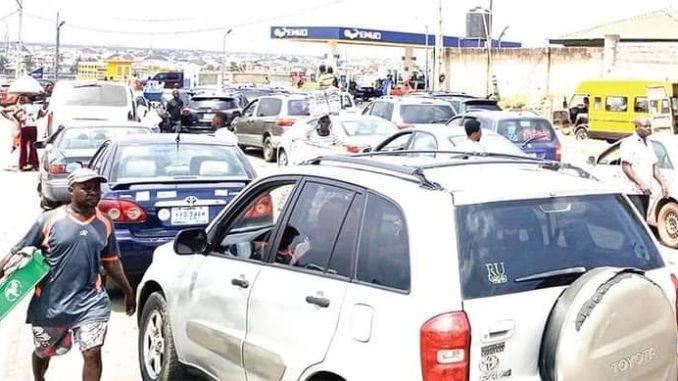
.
Fuel queues hit major cities of Lagos, Abuja, and Ogun on Monday, forcing motorists to spend hours at filling stations.
In Lagos and Ogun states, most people witnessed long queues at several filling stations such as Mobil, Capital, Fatgbems, Enyo, TotalEnergies, and NNPC.
Though there were products at these filling stations, which also sold at N165/liter, motorists struggled to get gasoline with which to run their economic lives.
There were also queues in states bordering the FCT, including Nasarawa and Niger.
In the Federal Capital Territory, there were long queues at various filling stations such as the NNPC, Mobil, A.A. Rano, AYA Ashafa, and Enyo, among others.
Hundreds of motorists besieged the few filling stations that dispensed petrol at various states, spending hours in queues in a bid to buy PMS.
Oil marketers blamed the development on the drop in supply, stating that the demand for petrol was currently higher than what was being provided by the Nigerian National Petroleum Company Limited.
NNPC is the sole importer of petrol into Nigeria, shouldering this responsibility for more than four years.
Speaking on the development, the President, Petroleum Products Retail Outlets Owners Association of Nigeria, PETROAN, Billy Gillis-Harry, said, “Lagos is having queues today, Kaduna is almost not having any PMS in its retail outlets.
“So, it is simply a situation of demand overwhelming supply. The supply process is not efficient to be able to meet the demands for products.”
Asked to explain whether there was not enough product, Gillis-Harry replied, “Well, clearly, if there is a product, it should be delivered. However, I know the authorities are doing their best to make sure that everyone is monitored and encouraged to sell products at the approved pump price.
“But there are no products in the retail outlets, which is why there will be queues. So, it clearly shows that demand has overwhelmed supply.”
But last Thursday, the Nigerian Midstream, and Downstream Regulatory Authority stated that there were over 32 days of the sufficiency of petrol by the NNPC.
Also, sources learned that the NNPC intentionally cut down the supply of products to fuel marketers.
A source familiar with the matter said that marketers, two weeks ago, had a meeting with the marketing arm of the NNPC and the Pipelines and Product Marketing Company, PPMC, where they were quizzed on the diversion of petroleum products to neighboring countries.
According to the source, the supply of products to oil marketers was subsequently reduced due to issues around product diversion.